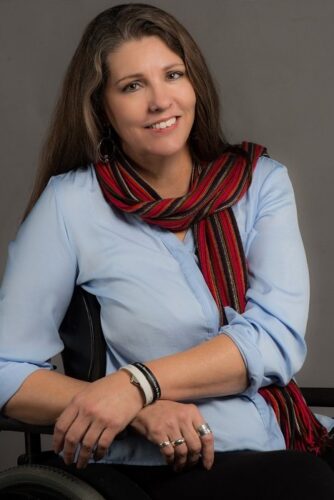#MediaMonday – Jennifer Longdon, Ability 360

One of our first clients doing disability advocacy work was ABIL, now called Ability360. They have recently launched a magazine and I asked Jen to tell us a little bit more about it. But you can’t learn about the magazine without first learning about Jen.
We’re sharing this post today because it is the day before the 26th anniversary of the signing of the Americans with Disabilities Act.
So Jen, what do you want to tell the blogosphere about yourself today?
My work at the nonprofit organization, Ability360, is a complete departure (I just couldn’t make a geometry pun) from my past career path. I am not a journalist or PR pro by education.
I was shot and paralyzed in a random shooting in 2004. I backed into this career by having my own story told badly and in the process of learning how to communicate effectively with media, I inadvertently became part of it.
I do two things as a result of my injury: gun violence prevention and disability advocacy. In the past 12 years, I have traveled the country speaking and writing on these issues. I’ve been fortunate to have amazing coaches and editors here at home who have each helped me grow, taught me something of the professional side of media and made me look less foolish in my work.
As a person with a disability, I’ve witnessed “our” stories told by individuals who do not understand our culture and use inappropriate and inaccurate language when telling stories about people with disabilities. Well-meaning reporters will paint pictures of “brave souls who inspire in spite of his or her tragic condition” or talk about people who are “handicapped” or, my personal pet peeve, wheelchair-bound or confined to a wheelchair. The AP guide advises against such language and an even better source is the style guide created by the National Center on Disability and Journalism, which is housed at the Cronkite School at ASU.
I was thrilled when Ability360 launched a quarterly lifestyle magazine for people with disabilities. Content typically focuses on Arizona-centric people, places and ideas that are disability-related.
Loren Worthington invited me to contribute to the inaugural issue and I’ve been on board with a growing work load ever since. We’ve just published the 5th edition of LivAbility and it has been an exciting (and terrifying) year of experimentation and creation.
We welcome well-told stories and story leads about people with disabilities and the organizations that serve them. The highlight of my job is working with our Cronkite interns. I enjoy helping them grow as professionals and I especially relish the advocacy piece of helping them bridge the world of typical and disability to understand there really is no chasm; that people with disabilities are simply people.
Our interns leave with a deeper, fuller meaning of the ability of people in general and a better lexicon for speaking about the disability experience which they carry with them and seed into their new careers and the newsrooms and organizations where they establish themselves. It’s a delightful bit of subversive advocacy.
When I’m not being an overly intense, vigilant advocate, I remain a hockey lover, devoted mother, adventurous home cook and aficionado of good coffee, great wine and lovingly brewed craft beer. I share my life with two giant dogs, Pearl the dragon and Porter (he has beer-colored eyes) the doofus, and spend my free time puttering around my historic home in the never-ending renovation process.
You can find more about Ability360 and LivAbility at ability360.org. You can reach me at Editor@ability360.org or through social media @jenlongdon on twitter and Instagram and Jennifer Longdon on Facebook.

